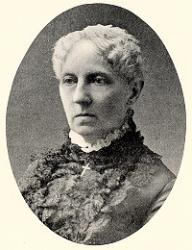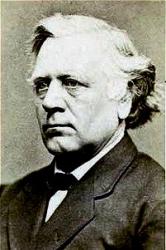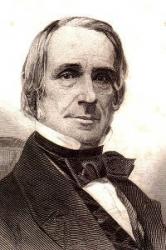1788 - 1866 Person Name: Friedrich Rueckert Hymnal Number: 379 Author of "I know not whither I go" in Singers and Songs of the Liberal Faith Rückert, Friedrieh, son of Johann Michael Rückert, advocate at Schweinfurt, in Bavaria, was born at Schweinfurt, May 16, 1788. He matriculated at the University of Würzburg Nov. 9, 1805 (where he became a great friend of Baron von Stockmar of Coburg), and finished his course there in the spring of 1809. He graduated PH. D. at Göttingen in 1810, and on March 30, 1811, began to lecture at Jena as a privatdocent in philology, but left April 16, 1812. On Nov. 2, 1812, he was appointed Professor of the Gymnasium at Hanau, but resigned before entering on his duties, and left Hanau Jan. 21, 1813. He was then for some time living at Würzburg as a man of letters, thereafter at Bettenburg near Hassfurt, &c. In Dec. 1815 he began work at Stuttgart as joint editor of the Morgenblatt, retiring from it Jan. 6, 1817. For some time he travelled in Italy, &c, and then in the end of 1820 settled at Coburg as a man of letters. On his appointment as Professor of Oriental Languages at Erlangen he went there in Nov. 1826; and then, in 1841, was appointed Professor of Oriental Languages at Berlin. During the Revolutionary period of March, 1848, he left Berlin and never returned, but received a pension in 1849. He retired to his estate of Neusess, near Coburg, and resided there till his death on Jan. 31, 1866…
Rückert was one of the greatest Lyric writers, and one of the most thoughtful and earnest poets that Germany has produced. From the time that, unable to take part in the wars against Napoleon, he issued his Deutsche Gedichte (at Heidelberg) in 1814, containing his famous "Geharnischte Sonnette," he published himself or contributed to the publications of others, a most voluminous mass of poetry original and translated; a complete edition of his poems appearing finally at Frankfurt am Main, 1868-69, in 12 vols. as his Gesammelte poetische Werke. A considerable proportion of his poems are translations and adaptations from the Persian, Arabic, Sanscrit and Chinese. Throughout his poems he preserves a high level of purity of thought and expression; and displays a wonderful mastery of form and power of handling the German language. He was of deeply religious spirit, and wrote various epic poems on Biblical history, e.g. Leben Jesu, 1839; Saul und David, 1843; and Herodes der Grosse, 1844. He can hardly however be called a hymn-writer; the second of the poems noted below being almost the only piece by him which has passed into the German hymnbooks. A large number of his poems have been translated into English by Archbishop Trench, Dr. John Hunt, Dr. N. L. Frothingham, Dr. C. T. Brooks, and various others.
Of Rückert's pieces we need here only note four, namely:—
i. Das Parodies muss schöner sein. Eternal Life. First published as one of his Neue östliche Rosen in the Aglaja for 1823. Included in his Gesammelte Gedichte, Erlangen, 1834, vol. i. p. 83, in 14 stanzas, entitled "Paradise." The translations are (1) "Oh! Paradise must show more fair," by Abp. Trench, in his Poems from Eastern Sources, 1842, p. 199. (2) "Oh, Paradise must fairer be." Given, without name of translator, in Dr. H. Bonar's New Jerusalem, 1852, p. 84, and in Schaff’s Christ in Song, 1869, p. 657.
ii. Dein Konig kommt in niedern Hüllen. Advent. This seems first to have appeared in his Gesammelte Gedicht, Erlangen, 1834, vol. i. p. 95, in 6 stanzas of 6 lines. It is based on St. Matt, xxi. 1-11, the Gospel for the 1st Sunday in Advent. It is included in the Berlin Geistliche Lieder, ed. 1863, No. 1545, and in various other recent German hymnbooks. The translations are: (1) "He comes, no royal vesture wearing." By T. C. Porter. Written April 5, 1868, for Hours at Home, N. Y., June, 18C8. (2) "In lowly guise thy King appeareth." By Dr. J. Troutbeck, as Schumann's Advent Hymn, Novello, N. D., 1876.
iii. Er ist in Bethlehem geboren. Bethlehem and Calvary. First published as No. 5 of a series of "Hymns for Festivals by Friedrich Rückert," in the Taschenbuch zum geselligen Vergnügen auf das Jahr 1824, Leipzig, 1824, p. 276, in 10 st. of 8 1. The translations are:--
(1) "In Bethlehem He first arose." By N. L. Frothingham, 1855, p. 168. (2) "In Bethlehem the Lord was born." By Miss Winkworth, 1869, p. 338. (3) "In Bethlehem, the Lord of glory." By T. C. Porter for Hours at Home, N. Y., March, 1868.
iv. Um Mitternacht hab ich gewacht. Midnight. The trs. are (1) "At still midnight I raise my sight." By N. L. Frothingham, 1855, p. 175. (2) "At dead of night Sleep took her flight." By Miss Winkworth, in Lyra Mystica, 1865, p. 266, and repeated in her Christian Singer, 1869, p. 337. [Rev. James Mearns, M.A.]
--edited from John Julian, Dictionary of Hymnology (1907)
Friedrich Rückert



